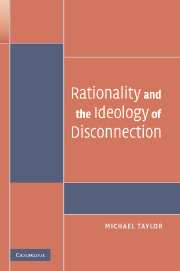Book contents
- Frontmatter
- Contents
- Preface
- Part one Attachments, reasons, and desires
- Part two Strokes of havoc: the market ideal and the disintegration of lives, places, and ecosystems
- 3 The market utopia
- 4 Dis-integration
- Postscript to part two: “Can selfishness save the environment?”
- Part three Living in unity, doing your part: rationality, recognition, and reciprocity
- Index
- Title in the series
4 - Dis-integration
Published online by Cambridge University Press: 12 January 2010
- Frontmatter
- Contents
- Preface
- Part one Attachments, reasons, and desires
- Part two Strokes of havoc: the market ideal and the disintegration of lives, places, and ecosystems
- 3 The market utopia
- 4 Dis-integration
- Postscript to part two: “Can selfishness save the environment?”
- Part three Living in unity, doing your part: rationality, recognition, and reciprocity
- Index
- Title in the series
Summary
The market dystopia and the loss of self and meaning
Karl Polanyi wrote in The Great Transformation that “To allow the market mechanism to be sole director of the fate of human beings and their natural environment … would result in the demolition of society…. Nature would be reduced to its elements, neighborhoods and landscapes defiled, rivers polluted … ” Polanyi's account of the history of actual markets and what (he thought) preceded them has not found much support from subsequent historical (and prehistorical) research. But this statement, I believe, is broadly correct – as a claim about what would happen if the market mechanism were allowed to become “the sole director,” a claim, that is, about what would happen in the world of the Market Ideal, where everything of value is privately owned, has a price, and is allocated in a perfectly competitive market. I briefly discuss the “demolition of society” in this section. I take up the disintegrative effects of markets on Nature in the following section. On this subject, Polanyi adds very little to the remark I've just quoted (see his Chapter 15). But at a time when almost no writer on economics, politics, or history so much as mentioned the “natural environment” (as one old guy, depicted in a recent New Yorker cartoon, said to another, as they smoked their cigars by the fireside, “I remember a time when there was no environment”), it was a remarkable claim to make; now, half a century later, we have some relevant empirical studies to draw on.
- Type
- Chapter
- Information
- Rationality and the Ideology of Disconnection , pp. 84 - 111Publisher: Cambridge University PressPrint publication year: 2006

